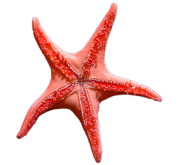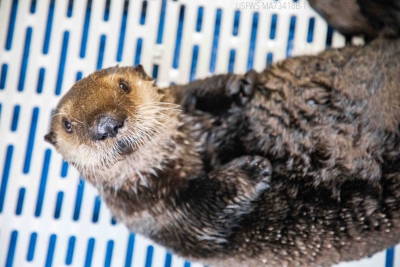Otter Pup Patient "Qilak" Arrives to New Home at Shedd Aquarium October 27, 2022
After nearly two months of rehabilitation at the Alaska SeaLife Center, male sea otter pup "Qilak" finds home in Chicago at Shedd Aquarium.
Qilak (pronounced Kee-lak), a five-month-old rescued male northern sea otter (Enhydra lutris kenyoni), arrived to his new home at Shedd Aquairum on October 24, 2022.
Since his rescue, the pup received around-the-clock care at the Alaska SeaLife Center (ASLC) in Seward, AK, the only permitted stranding marine mammal response facility in the state. Members of Shedd’s animal care and response team worked alongside partners to rehabilitate Qilak before bringing him to Shedd on Oct. 25.
For now, Qilak remains behind the scenes at Shedd as he continues to reach milestones and build bonds with the animal care team and other otters.
Qilak spent nearly two months being monitored day and night and receiving regular health exams by ASLC staff. He has feedings every four hours, which has slowly decreased as he continues to grow and progress. He has been doing well since his arrival in Chicago, receiving continual care behind the scenes at Shedd’s Abbott Oceanarium. At five months old, he is a bit older than past rescues, which means he has already met some developmental milestones and continues to show signs of independence.
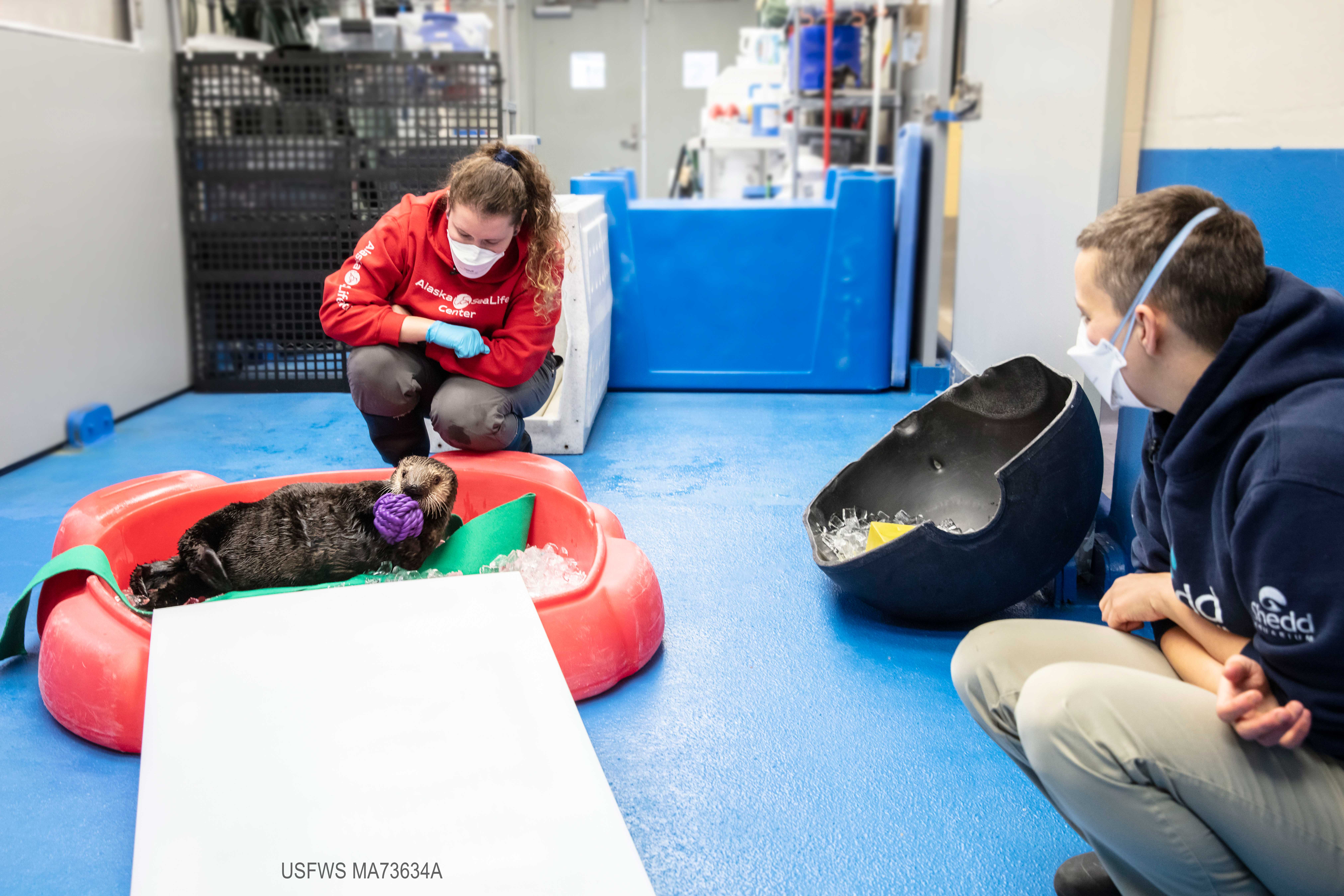
ASLC and Shedd staff worked together to care for Qilak during his last few weeks of rehabilitation. (photo: Shedd Aquarium)
The animal care team at Shedd looks forward to watching him continue to grow and thrive. Qilak’s next few milestones will be learning his new habitats, bonding with other otters and more.
“As an organization dedicated to care and conservation, Shedd Aquarium is equipped to step in to assist our partners, and in this case, we offered rehabilitation support and ultimately a home for this pup in need,” said Peggy Sloan, chief animal operations officer at Shedd Aquarium. “Our rescued population of sea otters are important ambassadors for their wild counterparts creating compassion for this keystone, endangered species.”
For now, Qilak remains behind the scenes at Shedd as he continues to reach milestones and build bonds with the animal care team and other otters.
Qilak spent nearly two months being monitored day and night and receiving regular health exams by ASLC staff. He has feedings every four hours, which has slowly decreased as he continues to grow and progress. He has been doing well since his arrival in Chicago, receiving continual care behind the scenes at Shedd’s Abbott Oceanarium. At five months old, he is a bit older than past rescues, which means he has already met some developmental milestones and continues to show signs of independence.
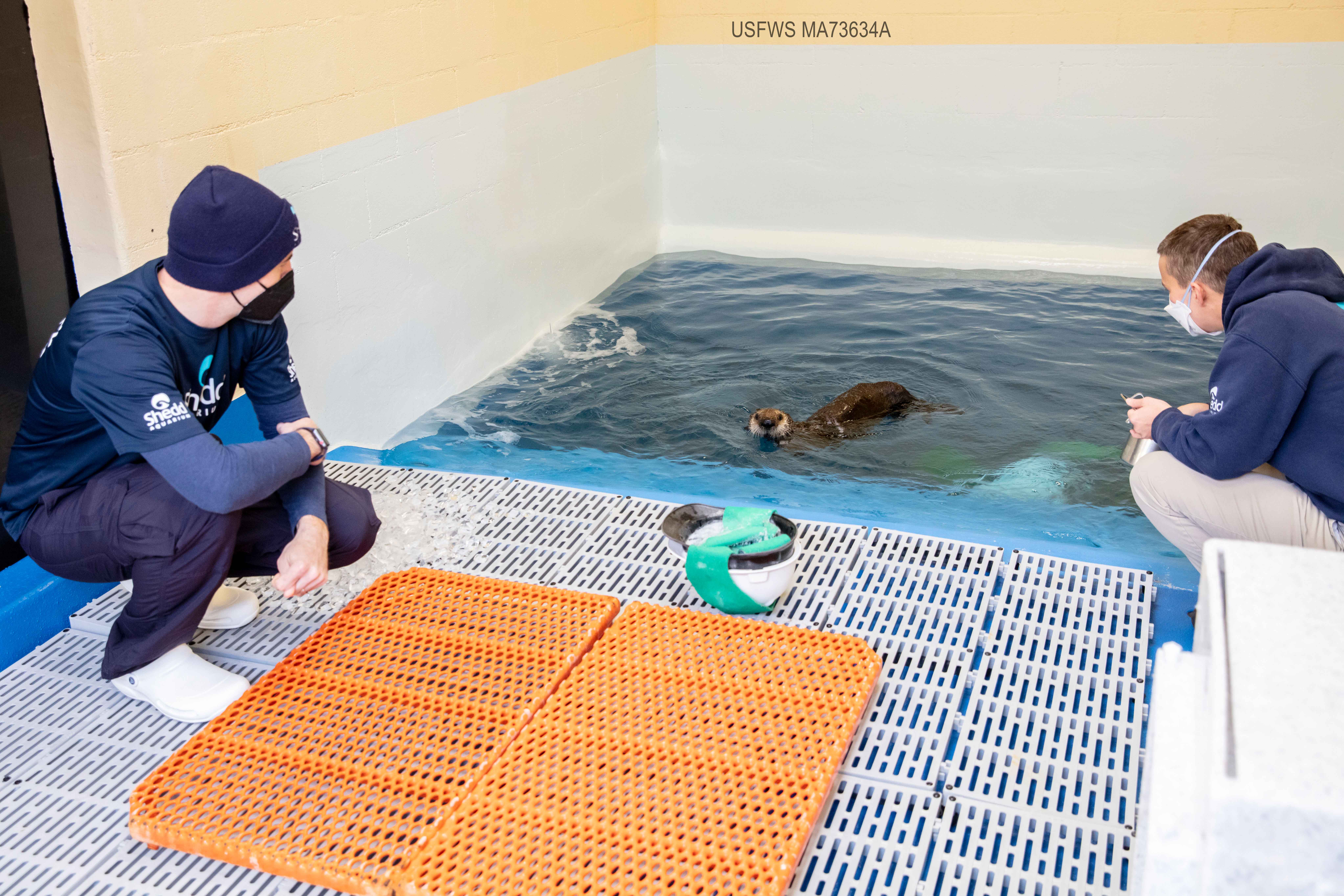
Shedd staff members observe Qilak at the Alaska SeaLife Center before his transport to Chicago. (photo: Shedd Aquarium)
The pup was examined at ASLC and found to be underweight, but otherwise, he was strong and alert. Veterinarians and animal care team members monitored him closely to ensure he remained in good condition. He was already eating solid foods, swimming, grooming and more. During his rehabilitation, Shedd’s animal care team sent a rotating group of support staff to work alongside ASLC for round-the-clock care. ASLC led the pup’s naming that resulted in Qilak, which means dome of the sky, the entire sky or heaven in Inuit.
“Otter pups need care and attention 24 hours a day, seven days a week, so it takes a village to rehabilitate a young animal,” said Jane Belovarac, Wildlife Response Curator at ASLC. “While the process is lengthy, there is nothing more rewarding than watching our patients grow and find their homes. We’ve been honored to be part of his second chance at life, and we’ll continue to follow his journey.”
Qilak joins the rescued sea otter population at Shedd Aquarium, including the other new arrivals Otters 926 and 929 that can now occasionally be seen on exhibit in the Abbott Oceanarium. There are now a total of six sea otters that call the aquarium home. Find more information about sea otters at Shedd on the aquarium’s website: https://www.sheddaquarium.org/animals/sea-otter.
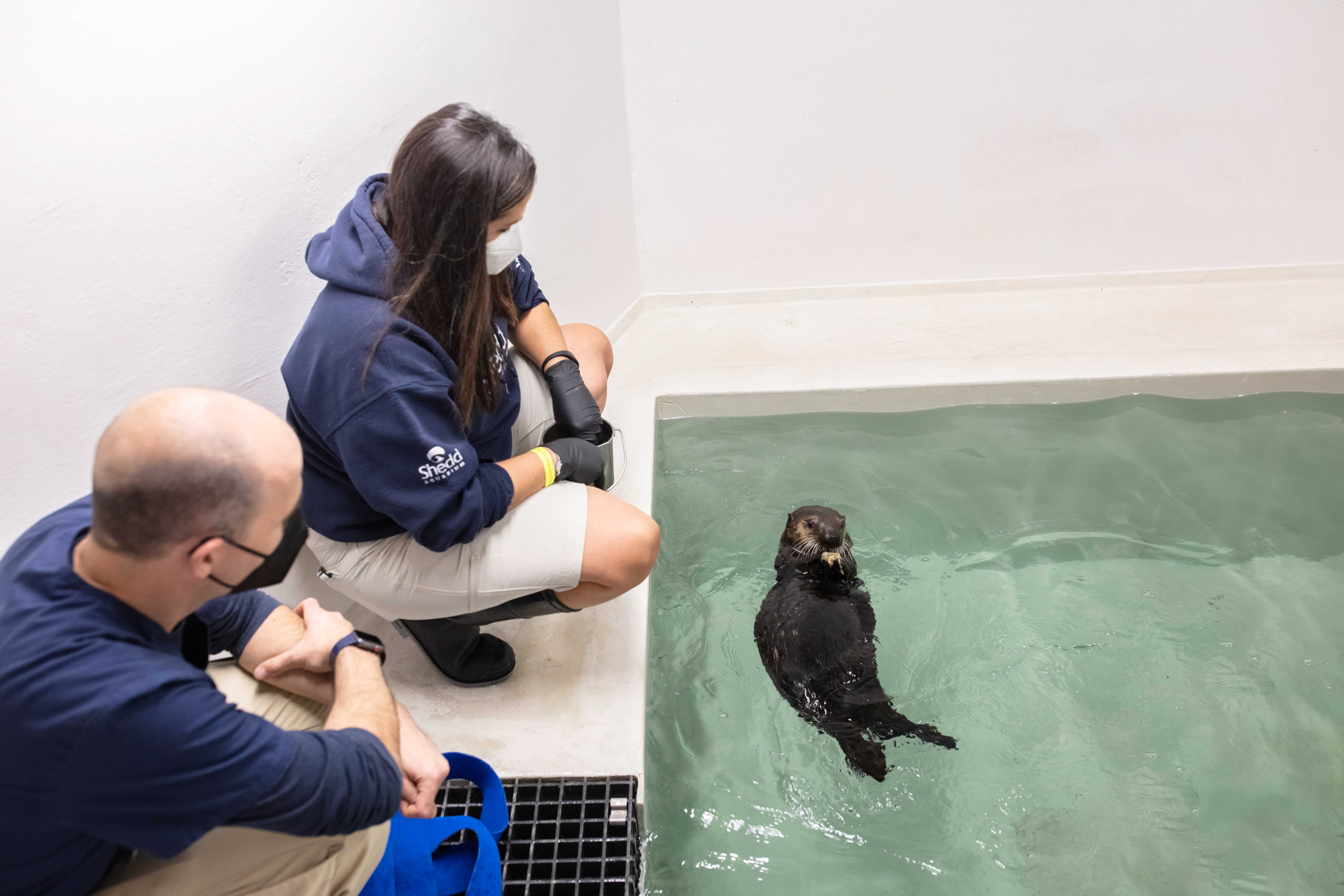
Shedd Aquarium staff report that Qilak is settling in well. This photo is from when he first arrived at Shedd (photo: Shedd Aquarium)
About Northern Sea Otters
The northern sea otter subspecies (E. lutris kenyoni), is found in the Aleutian Islands, Southern Alaska, British Columbia, and Washington. Within Alaska, there are three stocks. The Southeast stock can be found in the coastal waters of Southeast Alaska. The Southcentral population spans from west of Glacier Bay to the eastern edge of Cook Inlet. The Southwest population stretches from the western edge of Cook Inlet out the Aleutian Islands.
In Alaska, sea otter populations in Southcentral and Southeast Alaska have stabilized or are continuing to increase. However, in Southwest Alaska, sea otters have experienced a sharp population decline in the last 20 years. The sea otter species as a whole are listed as “Endangered” on the IUCN Red List, while the northern sea otter is listed as “Threatened.” Main threats in the wild include predation, overharvest, fishery interactions, disease, and oil spill.
Their main prey species include sea urchins, crabs, clams, mussels, octopus, fish, and other marine invertebrates. Sea otter teeth are adapted for crushing hard-shelled invertebrates such as clams, urchins, and crabs.
About the Alaska SeaLife Center
Opened in 1998, the Alaska SeaLife Center operates as a private, non-profit research institution and a public aquarium. It generates and shares scientific knowledge to promote understanding and stewardship of Alaska’s marine ecosystems. The ASLC is an accredited member of the Association of Zoos and Aquariums. To learn more, visit www.alaskasealife.org.
About Shedd Aquarium
The John G. Shedd Aquarium in Chicago sparks compassion, curiosity and conservation for the aquatic animal world. Home to 32,000 aquatic animals representing 1,500 species of fishes, reptiles, amphibians, invertebrates, birds and mammals from waters around the globe, Shedd is a recognized leader in animal care, conservation education and research. An accredited member of the Association of Zoos & Aquariums (AZA), the organization is an affiliate of the Smithsonian Institution and supported by the people of Chicago, the State of Illinois and the Chicago Park District. www.sheddaquarium.org

